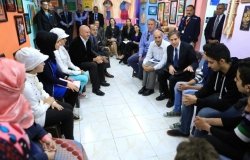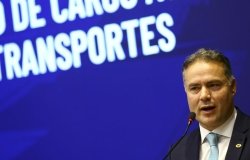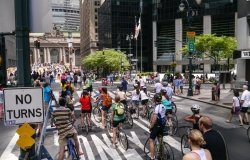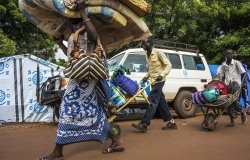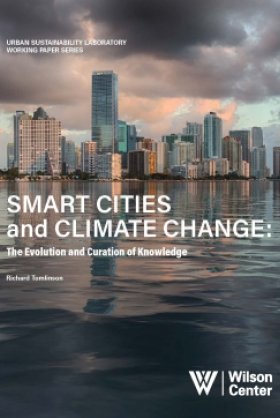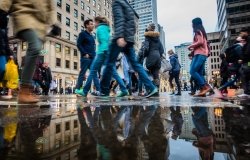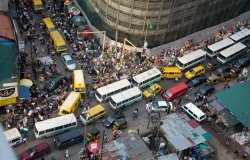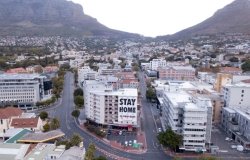Separate Cities: Poverty, Growth, and Inequality in Urban Areas
Steven Friedman, Centre for Policy Studies (South Africa); Aprodicio Laquian, University of British Columbia; Caroline Moser, Brookings Institution; Simon Schwartzman, Institute for Studies of Labor and Society (Brazil).
Overview
Over the next twenty years, most developing countries will become more urban than rural. Demographic trends indicate that poverty is also increasing in cities in the developing world. While regional economic growth trends have been positive in recent years, a troubling pattern of increasing poverty and inequality in cities remains. Poverty reduction always has been a principal goal of development efforts; but urban poverty is particularly complex since it represents a dual burden for local governments. Extensive and chronic poverty, especially among the marginalized poor, places a severe burden on urban services. More threatening, extensive urban poverty, and high levels of inequality, pose a threat to the sustainability of democratic governance because this social exclusion in urban areas can lead to violence, crime, and can increase a society's general sense of insecurity. On February 18th, the Comparative Urban Studies Project sponsored a seminar, Separate Cities: Poverty, Growth, and Inequality in Urban Areas.
Steven Friedman, Centre for Policy Studies (South Africa), began the panel with a presentation titled, "Question of Voice: Democratic Participation and Urban Poverty in South Africa." Friedman noted that there is an academic consensus that inequality is growing. However, the larger problem is that of voice, which he describes as a failure of representation in an effective and organized manner that ensures needs are met. The poverty challenge is a representation challenge. Cities are going to continue to deal with poverty, however they need to give more attention to democracy in order to promote leadership and collective action among those who lack a voice in the policy process. Friedman notes that the policy makers do not understand the urban landscape and lack the communication vehicles to open up the democratic potential that lies in the city.
Aprodicio Laquian, University of British Columbia, gave a presentation titled "Poverty, Growth and Inequality in Asia's Mega-Urban Regions." Dr. Laquian began his presentation by questioning the definition of urban poverty and presenting the wide range of definitions and characteristics found within the development community and Asian governments. This results in varying policies to limit poverty, enhance economic growth and reduce inequality. Unfortunately, many policy makers are awaiting the invisible hand that will eventually bring about a reduction in inequality as growth increases; Dr. Laquian noted that this is unlikely to happen. Local governments need to focus their efforts on direct pro-poor interventions such as health, housing, infrastructure, and basic services rather than wait for an automatic reduction in inequality that is unlikely to occur.
Caroline Moser, Brookings Institution, gave a presentation titled "Confronting Urban Myths: A Longitudinal Ecuadorian Perspective on Poverty and Inequality." Dr. Moser emphasized the need to re-examine poverty, that it is not a static concept, but rather incorporates a number of components such as risk, vulnerability and insecurity. Slums are not hotbeds of revolution, but rather absorb and integrate upwardly moving migrants and city-born urban citizens. Dr. Moser has been conducting a longitudinal study (1978-2004) of a community in Guayaquil, Ecuador and continued to present some of her preliminary findings. She noted that housing is the most important intergenerational asset of the poor and is valorized through, incremental infill, house upgrading, and plot densification. The high mobility of migrants, for example international migration, has contributed to the weakening of social capital in households. Dr Moser closed by emphasizing the disjuncture between aspiration and opportunities for migrants in urban areas, which has resulted in large groups of Ecuadorians living abroad in search of better opportunities.
Simon Schwartzman, Institute for Studies of Labor and Society (Brazil), gave the final presentation on "Urban Poverty in Metropolitan Brazil: Underdevelopment or Decay?" Dr. Schwartzman noted that poverty incidence is far higher in small and medium towns than in the metropolitan regions, and policies to combat urban poverty should be targeted accordingly. Any comprehensive strategy for poverty reduction must focus both on rural areas and on small and medium-sized towns. However, he noted that there is a tendency to focus mainly on rural poverty. He suggested some hypotheses for this preference as follows: it is closer to the notion of "traditional, primitive" society, it translates easily into the human rights and charity rhetoric ("hunger", misery), it leads to policy for people, bypassing or avoiding local governments and administration, and it is simpler. In closing, Dr. Schwartzman made some suggestions for a coherent urban poverty policy. In terms of economics, it is important to find replacements for old industrial and service activities. As for institutions there is a need to develop modern, inter-municipality administrative agencies, and civil service. He noted that is crucial to develop competence to deal with bad quality education and urban violence and develop viable legislation that will improve urban housing and urban property law.
Participants engaged the panelists with questions on participatory budgeting, how to create environments where public choices can be heard, and on impacts of decentralization. Caroline Moser responded by commenting that quick fixes don't create a panacea and Aprodicio Laquian noted that decentralization is often a myth in Asia, as the local government is the weakest government with little resources to provide services.
Hosted By

Urban Sustainability Laboratory
Since 1991, the Urban Sustainability Laboratory has advanced solutions to urban challenges—such as poverty, exclusion, insecurity, and environmental degradation—by promoting evidence-based research to support sustainable, equitable and peaceful cities. Read more
Thank you for your interest in this event. Please send any feedback or questions to our Events staff.
